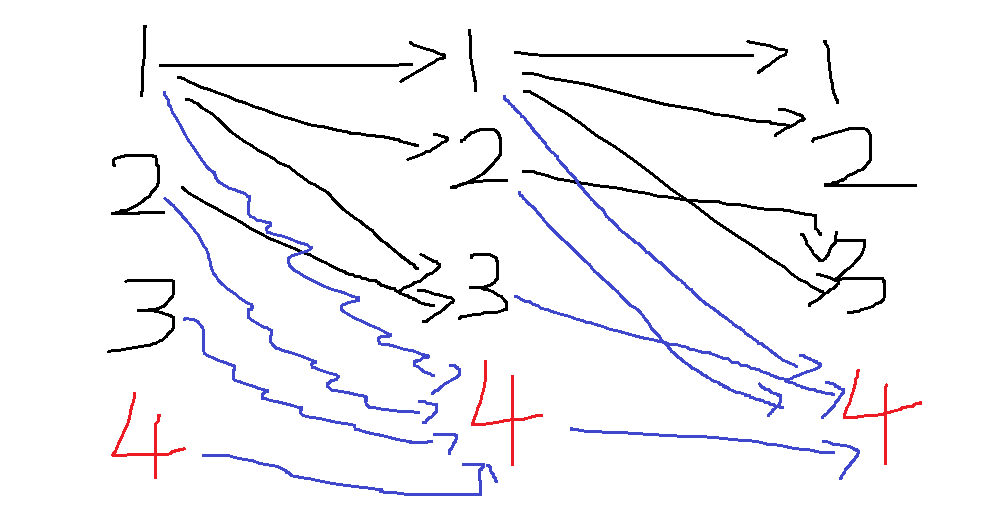http://acm.hdu.edu.cn/showproblem.php?pid=2243
这是一题AC自动机 + 矩阵快速幂的题目,
首先知道总答案应该是26^1 + 26^2 + 26^3 .... + 26^L,用等比数列的前n项和是无法做的,因为出现小数。
这个可以直接看到F[n] = 26 * F[n - 1] + 26,然后矩阵快速幂即可。
然后需要减去那些一个词根都不包含的单词的总数,这个可以用AC自动机算出来。就是至少包含一个词根的答案。
现在关键就是求,长度小于等于L的通路总数。
我们知道通路等于L的通路总数,正是一个可达矩阵e[i][j]的L次幂。
那么小于等于L的,也就是e + e^2 + e^3 + e^4 + ... + e^L
这是无法求的。
做法是新增一个节点,然后每一个节点都和这个新的节点连上一条边。

假设本来的可达矩阵是
e[1][1] = 1, e[1][2] = 1, e[1][3] = 1
e[2][1] = 0, e[2][2] = 0, e[2][3] = 1;
e[3][1] = 0, e[3][2] = 0, e[3][3] = 0;
那么长度是2的通路数就是,e^2,然后得到了这个图。

所以长度是2的通路数,是4。e[1][1] ---> e[1][1],e[1][1]--->e[1][2]。e[1][1] ---> e[1][3],e[1][2]--->e[2][3]
那么长度是1的通路数就不能统计了,就是e[1][1]、e[1][2]、e[1][3]丢失了。

那么我们新增一个节点,使得其他本来的节点都和它连一条边。
然后算e^2的时候,
就会把e[1][1]记录到e[1][1]-->e[1][4]中,所以记录成功。、
然后e[1][4]本来是不存在的,所以这条路径是多余的,

#include <cstdio> #include <cstdlib> #include <cstring> #include <cmath> #include <algorithm> #include <assert.h> #define IOS ios::sync_with_stdio(false) using namespace std; #define inf (0x3f3f3f3f) typedef long long int LL; #include <iostream> #include <sstream> #include <vector> #include <set> #include <map> #include <queue> #include <string> #include <bitset> typedef unsigned long long int ULL; const int N = 26; struct node { int flag; int id; struct node *Fail; //失败指针,匹配失败,跳去最大前后缀 struct node *pNext[N]; } tree[100 * 20]; int t; //字典树的节点 struct node *create() { //其实也只是清空数据而已,多case有用 struct node *p = &tree[t++]; p->flag = 0; p->Fail = NULL; p->id = t - 1; for (int i = 0; i < N; i++) { p->pNext[i] = NULL; } return p; } void toinsert(struct node **T, char str[]) { struct node *p = *T; if (p == NULL) { p = *T = create(); } for (int i = 1; str[i]; i++) { int id = str[i] - 'a'; if (p->pNext[id] == NULL) { p->pNext[id] = create(); } p = p->pNext[id]; } p->flag++; //相同的单词算两次 return ; } void BuiltFail(struct node **T) { //根节点没有失败指针,所以都是需要特判的 //思路就是去到爸爸的失败指针那里,找东西匹配,这样是最优的 struct node *p = *T; //用个p去代替修改 struct node *root = *T; if (p == NULL) return ; //树上bfs,要更改的是p->pNext[i]->Fail struct node *que[t + 20]; //这里的t是节点总数,字典树那里统计的,要用G++编译 int head = 0, tail = 0; que[tail++] = root; while (head < tail) { p = que[head]; //p取出第一个元素 ★ for (int i = 0; i < N; i++) { //看看存不存在这个节点 if (p->pNext[i] != NULL) { //存在的才需要管失败指针。 if (p == root) { //如果爸爸是根节点的话 p->pNext[i]->Fail = root; //指向根节点 } else { struct node *FailNode = p->Fail; //首先找到爸爸的失败指针 while (FailNode != NULL) { if (FailNode->pNext[i] != NULL) { //存在 p->pNext[i]->Fail = FailNode->pNext[i]; if (FailNode->pNext[i]->flag) { p->pNext[i]->flag = 1; } break; } FailNode = FailNode->Fail; //回溯 } if (FailNode == NULL) { //如果还是空,那么就指向根算了 p->pNext[i]->Fail = root; } } que[tail++] = p->pNext[i]; //这个id是存在的,入队bfs } else if (p == root) { //变化问题,使得不存在的边也建立起来。 p->pNext[i] = root; } else { p->pNext[i] = p->Fail->pNext[i]; //变化到LCP。可以快速匹配到病毒。 } } head++; } return ; } const int maxn = 30 + 3; struct Matrix { ULL a[maxn][maxn]; int row; int col; }; //应对稀疏矩阵,更快。 struct Matrix matrix_mul(struct Matrix a, struct Matrix b) { //求解矩阵a*b%MOD struct Matrix c = {0}; //这个要多次用到,栈分配问题,maxn不能开太大, //LL的时候更加是,空间是maxn*maxn的,这样时间用得很多,4和5相差300ms c.row = a.row; //行等于第一个矩阵的行 c.col = b.col; //列等于第二个矩阵的列 for (int i = 1; i <= a.row; ++i) { for (int k = 1; k <= a.col; ++k) { if (a.a[i][k]) { //应付稀疏矩阵,0就不用枚举下面了 for (int j = 1; j <= b.col; ++j) { c.a[i][j] += a.a[i][k] * b.a[k][j]; } } } } return c; } struct Matrix quick_matrix_pow(struct Matrix ans, struct Matrix base, int n) { //求解a*b^n%MOD while (n) { if (n & 1) { ans = matrix_mul(ans, base);//传数组不能乱传,不满足交换律 } n >>= 1; base = matrix_mul(base, base); } return ans; } int n, L; char str[222]; void work() { t = 1; struct node *T = NULL; for (int i = 1; i <= n; ++i) { scanf("%s", str + 1); toinsert(&T, str); } BuiltFail(&T); t--; Matrix e = {0}; e.row = e.col = t + 1; for (int i = 1; i <= t; ++i) { if (tree[i].flag) continue; int id1 = tree[i].id; for (int j = 0; j < N; ++j) { if (tree[i].pNext[j]->flag) continue; int id2 = tree[i].pNext[j]->id; e.a[id1][id2]++; } } t++; for (int i = 1; i <= t; ++i) { e.a[i][t] = 1; } Matrix I = {0}; I.row = I.col = t; for (int i = 1; i <= t; ++i) { I.a[i][i] = 1; } Matrix res = quick_matrix_pow(I, e, L); I.row = 1, I.col = 2; I.a[1][1] = 0, I.a[1][2] = 1; e.row = e.col = 2; e.a[1][1] = 26, e.a[1][2] = 0; e.a[2][1] = 26, e.a[2][2] = 1; Matrix res2 = quick_matrix_pow(I, e, L); ULL ans = res2.a[1][1]; // cout << ans << endl; for (int i = 1; i <= t; ++i) { ans -= res.a[1][i]; } ans++; //减了一个多余的路径 cout << ans << endl; } int main() { #ifdef local freopen("data.txt", "r", stdin); // freopen("data.txt", "w", stdout); #endif while (scanf("%d%d", &n, &L) > 0) work(); return 0; }
